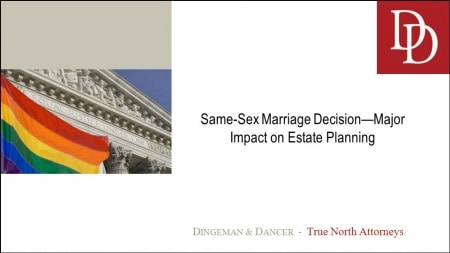
Same-Sex Marriage Decision—Major Impact on Estate Planning
Author: Benjamin W. Bryant
J.D., University of Michigan Law School
On June 26, 2015, the U.S. Supreme Court issued its opinion in Obergefell v. Hodges, holding that the Fourteenth Amendment requires a state to license a marriage between two people of the same sex and to recognize a marriage between two people of the same sex when their marriage is lawfully licensed and performed in another jurisdiction.
This landmark ruling has and will continue to have wide-ranging implications. One of the more practical effects of the decision involves estate planning and estate administration. Marriage is a legal contract that allows a couple to share finances in a specifically legislated manner. Now, a whole new group of Michigan residents has access to the benefits of tax and estate planning through marriage.
Prior to the ruling, same-sex couples were not guaranteed legal rights under state or federal law. In states that did not recognize same-sex marriages, many LGBT couples had to cobble together an effective estate plan, which required burdensome and novel constructs to achieve what was granted to other married couples as a matter of right. Same-sex couples were denied spousal and intestate rights of inheritance, spousal support in the event of divorce, guardian, and conservator priority, the right of both spouses to be recognized as parents to a child, and other guaranteed rights enjoyed by heterosexual spouses. This inequality made estate planning problematic, especially where divorce and employment benefits were concerned. Fortunately, the landscape has completely changed for the LGBT community.
After Obergefell, every married couple enjoys the same rights. Same-sex married couples no longer have to file separate state and federal tax returns, but rather, may now file jointly. Same-sex couples are also subject to dramatically different legal consequences upon the death or disability of their spouses. LGBT couples can prepare wills, trusts, end-of-life documents, and other critical estate planning instruments just like any other married couple. As a result, alternative tax and estate planning is longer required.
Under the new legal paradigm, it is critical for same-sex couples to consider the financial and legal consequences of marriage. Whether you are transitioning into a state recognized same-sex marriage or contemplating marriage, the importance of reviewing and updating your estate plan cannot be overstated. The experienced estate planning attorneys at Dingeman & Dancer, PLC can help you prepare your financial and legal affairs, to protect assets for future generations and provide peace of mind.